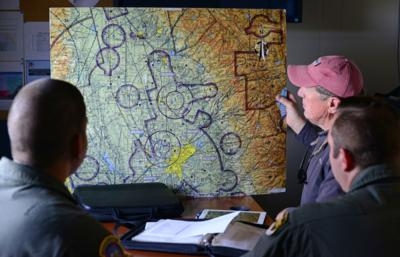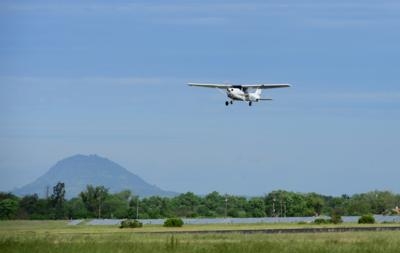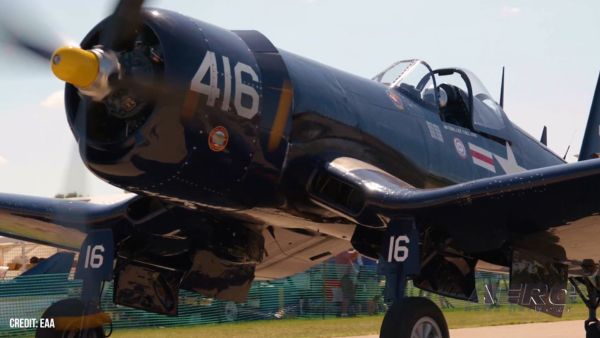UAS Candidates Receiving Manned Flight Training With The Beale Aero Club
Becoming an RQ-4 Global Hawk pilot requires specific training, which is unique to remotely piloted aircraft. This training means new pilots not coming from previous manned platforms often have limited experience in the cockpit of an aircraft. The 1st Reconnaissance Squadron is aiming to increase their level of experience with their new, innovative Aviation Fundamentals Training program funded through the Squadron Innovation Fund.

“We are having our RQ-4 student pilots receive additional training flying with the Beale Aero Club while they are going through the Formal Training Unit,” said Major Daniel, 13th Reconnaissance Squadron FTU flight commander. “It is a continuation of the training they receive in Initial Flight Training.”
The FTU partnered with the Beale Aero Club to ensure the pilots receive more experience in the local airspace by flying Cessna 172s.
“We started it to give the new pilots more experience in the air,” said Daniel. “AFT is designed to essentially improve airmanship, communication, and situational awareness. We just wanted to give them more experience for when they show up to their operational Global Hawk units.”
The program began in April and students who wanted to participate travelled to the Yuba County Airport on their own time to familiarize themselves with local air traffic conditions.
“We flew five flights,” said 2nd Lt. Rickey, 12th Reconnaissance Squadron RQ-4 pilot. “They wanted us to gather situational awareness from those flights by listening to the radios and making radio calls. Since we aren’t in the RQ-4 we can’t see other aircraft, so listening up on the radios is very important.”
According to Daniel, they conceptualized this unique training, with the help of the 12th RS, in the beginning of 2018.
“We are the first in the Air Force to do this,” said Daniel. “We initiated the concept of bolstering their airmanship training and started the program from scratch. AFT was our idea when we were brainstorming how we could improve the quality of the pilots coming out of FTU.”
The students themselves enjoyed the program and believe AFT helped them become better pilots. “I learned a lot from the Aero Club instructors,” said Master Sgt. Michael, 12th RS RQ-4 pilot. “We learned about communications and the local airspace.”

Funding for the AFT has been approved for the next year and Daniel believes the program has a bright future. “There have been only two classes who have gone through, so it is a relatively small sample size, but so far we have noticed improvements,” said Daniel. “We have already noticed an improvement in the grade sheets from the students in the area of airmanship and there have been fewer downgrades on check rides.”
Daniel said the success of the program is due in part to the work done by different 9th Reconnaissance Wing units. “This was a total wing effort to get this program off of the ground,” said Daniel “The backbone of the effort was done by different wing agencies, ranging from contracting, to finance and legal. They put in hours to make sure this program worked.”
The 12th RS is scheduled to start a training program similar to AFT and Daniel could see it translate to other RPA platforms such as the MQ-9 Reaper.
AFT has already shown promising signs, and if it continues to receive funding, it could become an integral part of Global Hawk pilot training. “I think the more experience we can give a pilot flying in the air will pay dividends years down the road,” said Daniel. “They are going to be better pilots operationally flying the Global Hawk, which is a mission with huge implications. They will also be better pilots when they become instructors themselves.”
(Images provided with USAF news release. Top: Tech Sgt. Ryan and Staff Sgt. Randall, 1st Reconnaissance Squadron RQ-4 student pilots, review a map of the local area with Craig Calhoun, Beale Aero Club instructor, April 15, 2018, at Olivehurst, California)
FMI:
Innovative First RS Training Provides RQ-4 Student Pilots Valuable Flying Experience
UAS Candidates Receiving Manned Flight Training With The Beale Aero Club
Becoming an RQ-4 Global Hawk pilot requires specific training, which is unique to remotely piloted aircraft. This training means new pilots not coming from previous manned platforms often have limited experience in the cockpit of an aircraft. The 1st Reconnaissance Squadron is aiming to increase their level of experience with their new, innovative Aviation Fundamentals Training program funded through the Squadron Innovation Fund.
“We are having our RQ-4 student pilots receive additional training flying with the Beale Aero Club while they are going through the Formal Training Unit,” said Major Daniel, 13th Reconnaissance Squadron FTU flight commander. “It is a continuation of the training they receive in Initial Flight Training.”
The FTU partnered with the Beale Aero Club to ensure the pilots receive more experience in the local airspace by flying Cessna 172s.
“We started it to give the new pilots more experience in the air,” said Daniel. “AFT is designed to essentially improve airmanship, communication, and situational awareness. We just wanted to give them more experience for when they show up to their operational Global Hawk units.”
The program began in April and students who wanted to participate travelled to the Yuba County Airport on their own time to familiarize themselves with local air traffic conditions.
“We flew five flights,” said 2nd Lt. Rickey, 12th Reconnaissance Squadron RQ-4 pilot. “They wanted us to gather situational awareness from those flights by listening to the radios and making radio calls. Since we aren’t in the RQ-4 we can’t see other aircraft, so listening up on the radios is very important.”
According to Daniel, they conceptualized this unique training, with the help of the 12th RS, in the beginning of 2018.
“We are the first in the Air Force to do this,” said Daniel. “We initiated the concept of bolstering their airmanship training and started the program from scratch. AFT was our idea when we were brainstorming how we could improve the quality of the pilots coming out of FTU.”
The students themselves enjoyed the program and believe AFT helped them become better pilots.
“I learned a lot from the Aero Club instructors,” said Master Sgt. Michael, 12th RS RQ-4 pilot. “We learned about communications and the local airspace.”
Funding for the AFT has been approved for the next year and Daniel believes the program has a bright future.
“There have been only two classes who have gone through, so it is a relatively small sample size, but so far we have noticed improvements,” said Daniel. “We have already noticed an improvement in the grade sheets from the students in the area of airmanship and there have been fewer downgrades on check rides.”
Daniel said the success of the program is due in part to the work done by different 9th Reconnaissance Wing units.
“This was a total wing effort to get this program off of the ground,” said Daniel “The backbone of the effort was done by different wing agencies, ranging from contracting, to finance and legal. They put in hours to make sure this program worked.”
The 12th RS is scheduled to start a training program similar to AFT and Daniel could see it translate to other RPA platforms such as the MQ-9 Reaper.
AFT has already shown promising signs, and if it continues to receive funding, it could become an integral part of Global Hawk pilot training.
“I think the more experience we can give a pilot flying in the air will pay dividends years down the road,” said Daniel. “They are going to be better pilots operationally flying the Global Hawk, which is a mission with huge implications. They will also be better pilots when they become instructors themselves.”
(Images provided with USAF news release. Top: Tech Sgt. Ryan and Staff Sgt. Randall, 1st Reconnaissance Squadron RQ-4 student pilots, review a map of the local area with Craig Calhoun, Beale Aero Club instructor, April 15, 2018, at Olivehurst, California)
 Aero-News: Quote of the Day (04.28.25)
Aero-News: Quote of the Day (04.28.25) ANN's Daily Aero-Term (04.28.25): Decision Altitude (DA)
ANN's Daily Aero-Term (04.28.25): Decision Altitude (DA) ANN's Daily Aero-Linx (04.28.25)
ANN's Daily Aero-Linx (04.28.25) Airborne-Flight Training 04.24.25: GA Refocused, Seminole/Epic, WestJet v TFWP
Airborne-Flight Training 04.24.25: GA Refocused, Seminole/Epic, WestJet v TFWP Aero-News: Quote of the Day (04.29.25)
Aero-News: Quote of the Day (04.29.25)




